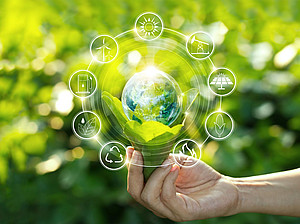We are dedicated to identifying sustainable interventions that will enhance decarbonization efforts and facilitate the transformation of social systems to meet the objectives of the Paris Climate Agreement, specifically in order to limit global warming to within 2°C above the pre-industrial average. By employing a transdisciplinary approach that integrates a variety of methodologies – from empirical social sciences to theoretical and computational modeling of socio-technical-ecological systems – we are well-equipped to comprehend the complex challenges presented by climate change and to identify effective solutions.
- A rapid, global socio-metabolic transformation is necessary to achieve a net-zero society by 2050.
- Socio-metabolic dynamics are complex, involving interactions and feedback loops among social, technical, and ecological systems, spanning from local to global scales.
- Socioeconomic inequalities and greenhouse gas emission disparities are strongly linked to the impacts of climate change.
- Committed minorities have the power to influence and shift the majority.
- Climate change negatively impacts human health, with vulnerable populations being particularly at risk.
- The adverse effects of climate change on human health can exacerbate social and economic inequalities, pushing societies closer to critical tipping points.
A rapid global transformation is needed to achieve the Paris Climate Agreement goals and limit global warming to below 2°C. This corresponds to reducing global anthropogenic greenhouse gas emissions by at least 7% per year and reaching carbon neutrality by 2050. These goals imply radical changes in the way human societies produce and use energy, and also require massive changes to, and reorganisation of, economic sectors and social and political institutions.

This research group aims to identify interventions that can lead to a global society that operates within planetary boundaries and meets the Sustainable Development Goals while taking into account citizen’s socio-metabolic profiles and different levels of human agency. A prerequisite for achieving these goals is global decarbonisation in the next 30 years. The interventions operate on different time and governance scales and for example can be related to the rate of adoption of renewable energy production technologies, low-carbon infrastructure development, changes in policies such as subsidies and taxation schemes, as well as changes in social norms and lifestyles. We focus on interventions that are compatible with the Sustainable Development Goals and analyse decarbonization pathways in different world regions together with their redistributive impacts.
We also ask about the impact of climate change on human societies, the economy, and health. We analyse how climate change impacts affect the vulnerability of different social groups, including pregnant women, children, the elderly, and vulnerable occupational groups.
Research themes
Our aim is to identify the actors and governance structures that have the capacity to implement the vital interventions needed for a swift reduction in global anthropogenic greenhouse gas emissions. We explore the structural changes required to strengthen the agency of key actors and social groups.
Analyzing the nonlinear mechanisms needed to spark rapid social change processes and disruptive system changes. For us, social tipping elements refer to subdomains of the planetary socioeconomic system where the required disruptive change may take place leading to decarbonization. We develop research methods, data gathering techniques, and new approaches in data analysis that can help us understand these dynamics.
Rising global temperatures and more frequent heat waves pose significant risks to human health, particularly for vulnerable groups. Our research focuses on the effects of extreme heat on pregnant and postpartum women, infants, and healthcare workers. We analyze the complex interactions between climate and health systems, explore predictive modelling of heat impacts, and study interventions that enhance resilience. Our work also includes the development of policies and practices that mitigate health risks and foster adaptation.
Identification of the legislative and institutional complexities of the disaster management frameworks under increasing pressures of climate change. This study is particularly focused on the global south which has several climate hotspots countries with the additional challenges of financial and political instability. This research will help to improve the resilience of the disaster management framework particularly in face of climate change.
We develop new modelling approaches that help us understand the above dynamics, intervention opportunities, and their short- and long-term impacts. We are particularly interested in multiscale modelling that links micro dynamics at the individual level to macro dynamics at the global level via the spectrum of intervening mesoscopic levels. We aim to share the learnings from our models with the public and policymakers, so they might help to guide more sustainable behaviour from the individual to the global level.
Social-ecological systems must continuously import useful energy and export wastes to maintain their complexity far from thermodynamic equilibrium and coevolve with socioeconomic processes. Climate change is driven primarily by the atmospheric accumulation of one sociometabolic waste - carbon dioxide - and is therefore a result of sociometabolism. We aim to advance the understanding of how social and metabolic processes are intertwined so as to identify effective interventions for mitigating the impacts of sociometabolism on the Earth system.
The climate crisis cannot be solved without addressing global inequalities. Many data sources show that top emitters with carbon-intensive lifestyles are responsible for a disproportionately large proportion of global life-style emissions. Carbon-intensive lifestyles of top emitters are driving aspirations of other social groups. We analyze socio-metabolic profiles of different social groups and study policies and institutional changes that support low carbon life-styles.
Adapting cities to climate change requires systemic transformations, as urban economic, social, political, and environmental components are deeply intertwined thus, necessitating a system science approach. We are interested in the potential of multi-stakeholder transnational networks of urban actors to exchange knowledge and share experiences, thereby accelerating the urban ecological transition.

Collaborations
The SoCo group collaborates with many national and international partner organizations, including for example, Potsdam Institute for Climate Impact Research, Complexity Science Hub Vienna, Oxford University and the Institute for New Economic Thinking, Center for System Solutions, the London School of Hygiene and Tropical Medicine, Stockholm Resilience Center, KTH Royal Institute of Technology Sweden, University of Natural Resources and Life Sciences, Vienna (BOKU), World Health Organization.
Projects of the Social Complexity and System Transformation research group
The project centres on pregnant and postpartum women, infants, and health workers, groups heavily affected by climate change.
We quantify and monitor direct and indirect health impacts of extreme heat; test a personalised Early Warning System (EWS); and implement integrated adaptation-mitigation actions in health facilities. Analyses of heat impacts and data science predictive modelling using data from Sweden; Lazio Italy, and health facilities in Kenya, Zimbabwe and South Africa underpin all activities. These analyses and systematic reviews inform testing and selection of global, EU and national indicators.
The per capita meat consumption in Austria is decreasing, it is far above the EU average. At the same time, Austria aims to be climate neutral by 2040, thus a decade before the EU-wide target. Despite decreasing emissions in the agricultural sector in Austria, agri-food systems are transforming far too slowly to support the EU’s progress towards climate neutrality. Consequentially, measures that help to trigger a far-reaching change in agri-food systems in the upcoming years are needed. As a response, our project proposes research on an intervention that can (i) jointly address the supply- and demand side and (ii) be quickly implemented to accelerate transformation processes toward carbon neutrality. We, thus, first used the social tipping points (STP) as a theoretical framework to identify its most relevant elements for the agri-food system transformation. We recognized norm- and value systems as suitable, given that (a) eating meat is culturally strongly embedded in Austria, and ( c) diets as a habitual behavior that does not easily change even if intentions do. To transform norms, STP proposes interventions to foster the recognition of the immorality of fossil fuels or even the overall emission of greenhouse gases. Recent findings show the visibility or invisibility of climate change in media influences the advocacy for or against fossil fuel exploitation. Our project thus proposes investigating advertisements as an intervention to transform norms based on (i) their visibility in media, (ii) their recent use as a proxy for norms, (iii) their function to induce a (consumption) behavior, (iv). They are quick to implement and stand at the interface of demand and supply. We study the social tipping dynamics of advertisements, norms, and behaviors to foster climate neutrality in agri-food systems using a complementary methodological approach consisting of quantitative experiments, agent-based models, and warm data labs, a transdisciplinary conversation practice.
Completed projects
The aim of AAR2 is to assess the state of knowledge on climate change in Austria and its consequences, as well as to identify mitigation potentials and strategies, adaptation options and transformation pathways. Gaps in knowledge are to be closed in the sense of a climate-neutral society.
SoCo has the lead for Chapter 5: Navigating Demand-side Transformations towards Net-zero
ENBEL supports EU policy making by bringing together leaders in climate change and health research.
REBOOST aims to support stakeholders in three European lignite regions (Lusatia in Germany, Konin in Poland, and Gorj in Romania) in the transition from the current high economic dependence on lignite to a low-carbon future. The three regions share some characteristics that make the transition process difficult, including economic downturn, aging populations, lack of job opportunities, and weak stakeholder cooperation. However, the regions differ with respect to the availability of political support from governments and funding for the transition process. We will use strategic simulation techniques to involve and empower local stakeholders in the design and exploration of alternative future pathways in an interactive environment that will resemble the main socio-economic and geographical characteristics of the actual regions. The results of the simulations will be shared using an online plattorm what will stimulate mutual learning and innovation diffusion across the three regions. This exercise will also promote reskilling and formation of stakeholder coalitions for regional transformations. Where possible, the project will support the actual implementation of alternative and promising solutions to lignite-fired power generation. Building on the outcomes, promising follow up actions will be implemented with the potential to feed into a Deep Demonstration Just Transformations.
Complementary approaches including deep listening techniques and economic assessment methods will be used to fully explore the stand points, needs, and preferences of different stakeholder groups and to assess the future alternatives to lignite-fired power generation and implications for changes in the local economy and labour market. Finally, the project will explore the opportunities for increased engagement with the EU political processes and funding possibilities.
| +43 316 380 - 8464 https://homepage.uni-graz.at/de/ilona.otto/ |
| +43 316 380 - 8352 https://andrewringsmuth.com/ |
| +43 316 380 - 8351 |
Lena Valentina Mair BSc | |
Kehkashan Mansoor MSc | |
Viktor Valentin Marschall | |
| +43 316 380 - 7513 |
| +43 316 380 - 8471 |
Johanna Pfeifer | +43 316 380 - 8428 |
Irene Pomberger | |
Lorenzo Silvestri dipl. | +43 316 380 - 7434 |
| |
| +43 316 380 - 7510 |